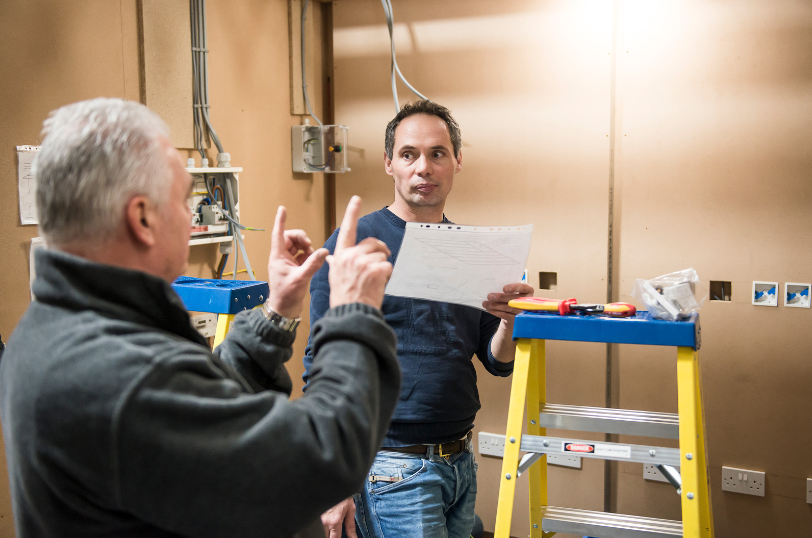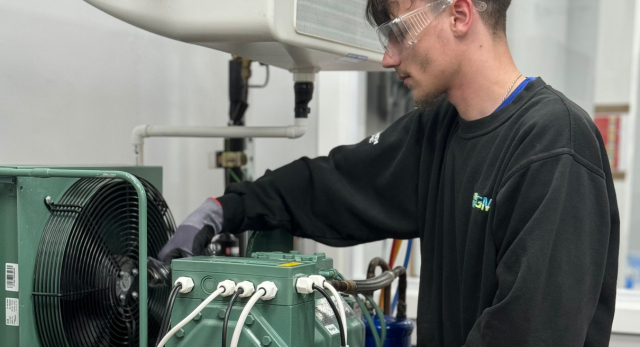At Logic4training we offer a variety of electrical training courses. Whether you are a new entrant or an experienced electrician.
If you are looking for a new career, there is no better time to train as an electrician. Electricity demand is expected to more than double by 2050 as key sectors, such as domestic heating and transport, decarbonise through electrification.
Electrical engineering is a varied career which could see you working domestically in privately owned or rented homes, in the renewables sector, on large-scale building services in commercial buildings, in industrial settings or for the National Grid.
Electrical training courses for all levels
Whether you are a new entrant to the electrical sector looking to start your training, a gas and heating engineer or plumber looking to gain some new skills, or an experienced electrician seeking the next step on the ladder. We offer a variety of electrical training courses to suit your needs.
Electrician training – what are the options?
The route you take very much depends on your previous experience and what job you want to do.
Intensive electrician course
The quickest way to start work in the electrical sector is by training as a domestic electrical installer.
We offer foundation and advanced-level training programmes suitable for new entrants or candidates whose primary role is not electrical. It may involve elements of wiring or electrical installation.
- Foundation New Entrants Domestic Electrical Installer (NEDEI) training programme – this basic electrical training course covers all the core competencies required to install and maintain electrics in residential properties, including:
- 18th Edition Wiring Regulations – City & Guilds (2382-22, Level 3) qualification
- Initial Verification, Testing and Certification of Electrical Installations – LCL Awards Level 3 RQF qualification
- Domestic Electrical Installer (Part P) – LCL Awards qualification
- Asbestos Awareness – online course certificate
- Manual Handling – online course certificate
- Fire Safety – online course certificate
- Working at Heights – online course certificate
- Working Safely – online course certificate
- Advanced NEDEI training programme – once the foundation phase is completed, you can move onto the advanced phase which includes LCL Awards Level 3 Certificate in Installing, Testing and Ensuring Compliance of Electrical Installations in Dwellings.
- Join an electrical CPS Scheme – together with two years’ experience, this qualification is recognised and accepted under the EAS scheme for entry to a Competent Person Scheme covering Part P of the Building Regulations as a Qualifying Supervisor (QS) for Dwellings.
Do I need to do the 2391 course?
2391 refers to the City & Guilds qualification that covers initial and periodic electrical inspection and testing.
We deliver the LCL Awards equivalent of 2391:
Initial Inspection & Testing Course – Level 3 RQF
Periodic Inspection & Testing Course – Level 3 RQF
By splitting out the initial and periodic elements, we offer the same quality qualification that is recognised by all the major CPS schemes. Providing more choice and flexibility for electrical installers.
Do you do evening electrical courses?
No, but we do run many of our courses on the weekends, making training more accessible for candidates who can’t give up their time in the week. We deliver some training courses online, where appropriate, and all our trainees have access to ClubLogic. Our online learning environment which allows you to digest course information in your own time – at home in the evening, sitting in the van, or on a lunch break, for example.
What are my future prospects following completion of this course?
This entry-level course is a great starting point for a career in the electrical sector – it gets you the core qualifications you need to start work as a domestic electrical installer. Your job could include tasks such as rewiring or replacing light fixtures in residential settings.
After gaining two years of work experience, you will be able to join a CPS scheme, such as NAPIT, and self-certify your work.
Once you are an experienced domestic electrical installer, you might decide to become a fully qualified electrician by completing a Level 3 electrical NVQ – the qualification that is recognised as the benchmark in knowledge, experience, and competency for practicing electricians the UK.
Request a call back to discuss your options further.









